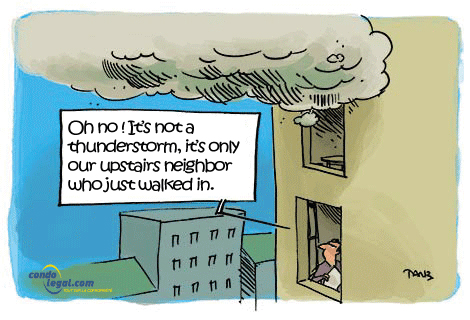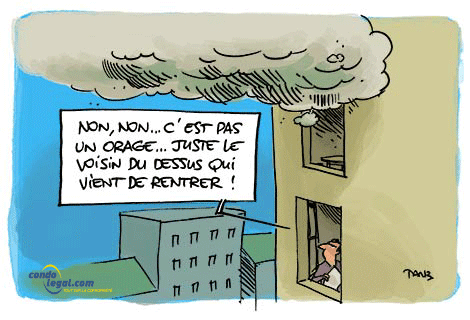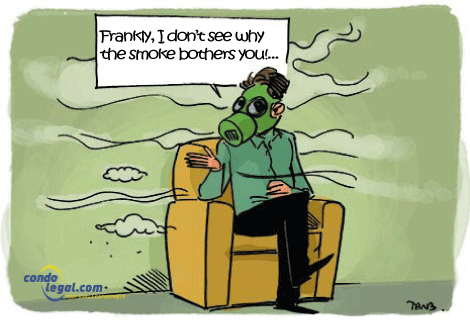Banning the consumption of cigarettes and cannabis in co-ownerships
 A source of permanent controversy in co-ownership, cannabis and tobacco smoking arouse passions. However, it is recognized that there is no inalienable right for a co-owner to smoke in the common portions or in a private portion. On the contrary, the common law on abnormal neighbourhood disturbances and the effects of second-hand smoke on the health of people exposed to it advocate prohibition. In this regard, the right to life and to the safety and integrity of the person enshrined in the Charter of human rights and freedoms is moving towards an obligation to abstain from smoking in collective dwellings.
A source of permanent controversy in co-ownership, cannabis and tobacco smoking arouse passions. However, it is recognized that there is no inalienable right for a co-owner to smoke in the common portions or in a private portion. On the contrary, the common law on abnormal neighbourhood disturbances and the effects of second-hand smoke on the health of people exposed to it advocate prohibition. In this regard, the right to life and to the safety and integrity of the person enshrined in the Charter of human rights and freedoms is moving towards an obligation to abstain from smoking in collective dwellings.
Under the circumstances, should co-ownership syndicates banish this habit? This is not an easy question to answer. Easier said than done, some will say. And they are not wrong. Here’s a look at the whole legal issue that defines smoking in co-ownerships.
No smoking in the common portions
The Tobacco Control Act prohibits anyone from smoking in enclosed public places. This prohibition applies, among other things, to the enclosed common areas of any building held in co-ownership that houses two or more residential units. Terraces and outdoor areas operated in the course of a commercial activity are also covered by this prohibition. The term "smoking" " also covers the use of an electronic cigarette or of any other device of that nature", while the word "tobacco" " includes the following accessories: cigarette tubes, rolling paper and filters, pipes, including their components, and cigarette holders." (Art. 1.1).
Smoking is thus clearly prohibited in "enclosed common areas", such as, for example, a community hall, a hallway or an elevator. However, a co-ownership is not subject to the prohibition of smoking within nine meters of a door, window or air intake (Art. 2.2). It should also be noted that "common areas" should not be confused with "common portions". The law only covers "closed" public spaces. It cannot therefore apply to all the common portions of a co-ownership, for example balconies that are qualified as common portions for restricted use.
In addition, the general interest of the community of co-owners, the protection of their quality of life, that of the tenants and / or occupants of the building, as well as the preservation of air quality justify the adoption of a regulation prohibiting the consumption of cannabis or tobacco in the common portions. This by-law should be part of the " By-laws of the immovable" section of the declaration of co-ownership. Consequently, the favourable vote required for their adoption is that provided for in article 1096 of the Civil Code of Quebec, i.e. the vote of a majority of the votes present or represented at the meeting of co-owners. Once adopted, this by-law should be immediately filed in the register of co-ownership, in order to be enforceable against all co-owners.
No smoking in the private portions
Second-hand smoke can find its way from one private portion to another, through crevices and breaches in walls, floors or ceilings, in electrical outlets, telephone or cable sockets, pipes or light fixtures. Poorly calibrated ventilation systems can also be a cause of this migration. Under the circumstances, can the consumption of cigarettes in private areas be banned?
There is no legislation prohibiting the consumption of cigarettes in a private portion. However, it is undeniable that cigarette smoke permeates objects and materials with an almost permanent smell. Because of the way some co-ownerships are built, smoke can even spread throughout the building. As a result, a co-owner, tenant or smoker can impose second-hand smoke on others, resulting in risks to human health. In a 2019 decision, the Quebec Superior Court upheld a building by-law prohibiting "the use of any smoked product within all private parts, as well as within all closed common portions for the exclusive or non-exclusive use of the co-owners." The court found that the by-law did not change the destination of the immovable, but rather was an extension of its residential destination, given a lack of isolation between the residential units in the building.
Justice Chantal Masse added: "There is no inalienable right to smoke in his unit for each co-owner; on the contrary, the common law on neighbourhood disorder, section 976 C.c.Q. and the special provision of section 1063 C.c.Q.,in competition with the many judicial authorities linking the effects of second-hand smoke to the health of those exposed to it, and the Charter of Human Rights and Freedoms and the right to life and safety and integrity of the person it enshrines, instead move towards an obligation to abstain from smoking in environments that make other people susceptible to see their health affected by second-hand smoke, whether it is a workplace, hospitals or residential settings as in this case."
However, caution must be exercised. Beyond the above statements, it should be noted that this decision remains a case in point resulting from evidence specific to this case. The relevance and validity of a clause that prohibits smoking in a unit is therefore not universal. They depend on the particular context of each building. In the circumstances, it is necessary to consider whether prohibiting a co-owner from smoking tobacco, cannabis or other odours substances (such as cigars) in a unit restricts his or her rights and, if so, whether the restriction is justified by the purpose of the immovable. It is therefore necessary to refrain from identifying a general principle, namely that a regulation would be sufficient for a syndicate to prohibit anyone from smoking in the private portions.
Implementation of the Tobacco Control Act
Infractions to the Tobacco Control Act are subject to fines. Inspectors have been appointed to enforce the Tobacco Control Act, against natural and legal persons. Anyone impeding the work of an inspector or refusing and/or neglecting to supply, following the request of an inspector, information or documents related to the application of the Tobacco Control Act and its Regulations, can also be fined.
 WHAT YOU SHOULD KNOW ! A co-owner inconvenienced by second-hand smoke could consider a lawsuit for neighborhood disturbances against the co-owner concerned. The applicant will nevertheless have to show that this nuisance is abnormal, and that it exceeds the limits of the tolerance that neighbors owe, under section 976 of the Civil Code of Québec.
WHAT YOU SHOULD KNOW ! A co-owner inconvenienced by second-hand smoke could consider a lawsuit for neighborhood disturbances against the co-owner concerned. The applicant will nevertheless have to show that this nuisance is abnormal, and that it exceeds the limits of the tolerance that neighbors owe, under section 976 of the Civil Code of Québec.
 WHAT TO KEEP IN MIND : Article 1056 of the Civil Code of Quebec states that the declaration of co-ownership (as well as the amendments made to it) may impose any restriction on the rights of the co-owners except restrictions justified by the destination (intended use of the immovable), its characteristics or its location. One of the aspects of these characteristics is the quality of the construction of the building. Therefore, it may be permissible to prohibit in a building (common and private portions) any consumption of a substance that emits smoke when the physical characteristics of the building do not ensure adequate partitioning between the private or common portions of second-hand smoke.
WHAT TO KEEP IN MIND : Article 1056 of the Civil Code of Quebec states that the declaration of co-ownership (as well as the amendments made to it) may impose any restriction on the rights of the co-owners except restrictions justified by the destination (intended use of the immovable), its characteristics or its location. One of the aspects of these characteristics is the quality of the construction of the building. Therefore, it may be permissible to prohibit in a building (common and private portions) any consumption of a substance that emits smoke when the physical characteristics of the building do not ensure adequate partitioning between the private or common portions of second-hand smoke.
 WARNING ! It must be understood that the physical situation of terraces and balconies, in a co-ownership, can cause discomfort for some occupants, when the immediate neighbors are smokers. Most of the time, these structures are superimposed and located very close to each other. "However, the protection of the health of co-owners must take precedence over the freedom of smokers."
WARNING ! It must be understood that the physical situation of terraces and balconies, in a co-ownership, can cause discomfort for some occupants, when the immediate neighbors are smokers. Most of the time, these structures are superimposed and located very close to each other. "However, the protection of the health of co-owners must take precedence over the freedom of smokers."
Back to the factsheets




